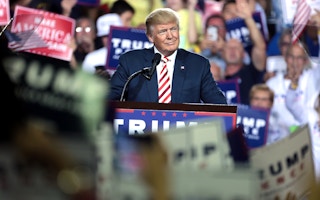Donald J. Trump’s return to the White House is a remarkable political comeback, but for those invested in environmental, social, and governance (ESG) initiatives, his re-election spells a serious setback. Trump’s opposition to regulatory oversight – particularly on climate change and social inclusion – signals a halt to United States policy support for many sustainability and social equity initiatives.
While this disrupts the ESG landscape, it is not a death blow. The momentum for sustainable practices, which took root in the late 1990s, has gained strong footholds in the European Union, China, and among many US corporations. Yet, without robust US government involvement, ESG efforts will be slowed.
Trump’s return highlights an urgent need for ESG policies to be not only ambitious but equitable and credible. Across nations, there is visible anger over the rising costs of living, which voters often attribute to progressive climate policies.
In Southeast Asia, leaders have shown an understanding of this balance, prioritising affordable policies that don’t overlook working-class citizens. In practice, this often means more fossil fuel subsidies, continued investment in infrastructure, and a cautious approach to environmental regulations. Without a “just transition,” criticism of ESG as an “elite scam” gains traction, resonating with those who feel excluded from the promised benefits of these policies.
The ESG agenda must grapple with a fundamental question: has it genuinely improved the environment and lives on the ground? Has it strengthened labor rights, raised wages, or held major corporations accountable for their environmental impact? Or has it simply become more paperwork, tax incentives, and subsidies that favor large corporations, while ignoring the concerns of normal people?
In the US, rural and working-class voters, who’ve been increasingly abandoning the Democratic Party, feel alienated by ESG policies and the progressive agenda. These groups might wonder if sustainability initiatives serve their interests, or if they merely serve as talking points for corporate lobbyists and fund-raising non-governmental organisations.
Southeast Asia’s palm oil industry is a good example of this, where the push for sustainable palm oil has, in many cases, burdened smallholder farmers with higher compliance costs and reduced market access. Large-scale producers, with their greater economies of scale, have managed to navigate the regulatory landscape more easily, consolidating their hold on global supply chains while the smallholders are often left out.
For many, these developments support claims that ESG regulations are a form of neo-colonialism or “regulatory imperialism”. The sense of injustice makes it easier to downplay climate concerns, harming both the social and environmental goals that the ESG movement seeks to promote. If policymakers and ESG proponents fail to address these issues – if they don’t ensure that the ESG agenda directly benefits working class and rural communities – the credibility of ESG will deteriorate further.
Dr Pieter E. Stek is a postdoctoral scholar at the Center for Technology, Strategy and Sustainability (CTSS) at the Asia School of Business in Kuala Lumpur.









